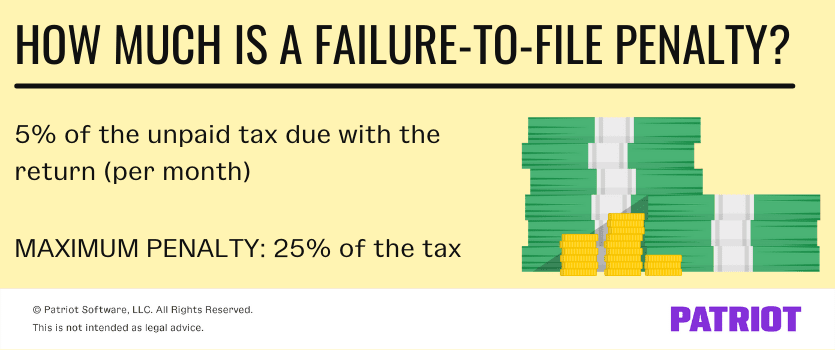Procrastination can be costly. If you put off submitting your employer tax returns too long, you could wind up with a failure-to-file penalty. And no employer wants that.
Want to avoid an IRS failure-to-file penalty? Read on to learn your employer depositing and filing responsibilities and what you need to know about an IRS failure-to-file penalty.
Employer depositing and filing responsibilities
Being an employer comes with payroll responsibilities, including paying your employees, collecting and contributing payroll taxes, and reporting it all to government agencies.
Long story short, you must deposit and report taxes to the IRS and state and local governments.
Depositing responsibilities
Employers are generally responsible for withholding and/or contributing:
- Federal, state, and local income taxes
- Social Security and Medicare taxes (aka FICA tax)
- Federal and state unemployment taxes
- State-specific taxes
After you withhold and contribute employment taxes, set the funds aside until you deposit them with the IRS and your state and local governments.
Deposit federal income, Social Security, and Medicare taxes according to your deposit schedule (monthly or semiweekly). Your deposit schedule is based on a four-quarter lookback period. And, deposit federal unemployment taxes quarterly.
Check with your state to find out when your state and local tax deposits are due.
Filing responsibilities
In addition to depositing taxes, you must report them (along with employee wages) on payroll reports. Report payroll taxes to the IRS using Forms:
Form 941, Employer’s Quarterly Federal Tax Return, is a form employers must file four times throughout the year to report employee wages, tips, and payroll taxes withheld. The quarterly tax return is due:
- April 30 (Quarter 1)
- July 31 (Quarter 2)
- October 31 (Quarter 3)
- January 31 (Quarter 4)
Some small businesses with a tax liability of $1,000 or less for the year can file an annual version of this form: Form 944, Employer’s Annual Federal Tax Return. Form 944 is due annually by January 31.
Use Form 940, Employer’s Annual Federal Unemployment Tax Return, to report your federal unemployment tax liability. Submit Form 940 to the IRS by January 31 each year.
You may also need to use state and local payroll reports for non-federal deposits. Check with your state and locality for more information on due dates.
What is a failure-to-file penalty?
Failure-to-file (FTF) happens if you fail to file a tax return to the IRS by the due date. Any taxpayer can incur a failure-to-file penalty by failing to submit individual, employer, or business tax returns.
Employers can incur a failure-to-file penalty if they do not submit employer tax returns (e.g., Form 941) by the deadline. The IRS also charges interest on penalties, which is an additional amount due.
If the IRS assigns a failure-to-file penalty, you will receive an IRS notice or letter telling you why and what you need to do.
IRS failure-to-pay penalty vs. failure-to-deposit vs. failure-to-file
A failure-to-file penalty isn’t the only cost the IRS might assign for payroll tax-related tardiness. Taxpayers can also get a failure-to-deposit (FTD) penalty or a failure-to-pay (FTP) penalty.
So, what’s the difference?
- Failure to file (FTF): Penalty taxpayers get if they do not file a return on time.
- Failure-to-deposit (FTD): Penalty employers get if they do not deposit employment taxes on time, in the right amount, or in the right way.
- Failure-to-pay (FTP): Penalty taxpayers get if they do not pay the tax they report on their tax return by the due date.
The IRS might assign one or multiple types of penalties.
How much is a failure-to-file penalty?
A failure-to-file penalty is 5% of the unpaid tax due with the return for each month (full or partial) a taxpayer doesn’t file a return. The maximum FTF penalty is 25% of the tax.

So, your IRS late filing penalty amount depends on:
- How late the return is
- The amount of the unpaid tax due with the return
Keep in mind that the 5% penalty per month only applies to failing to file. There is also a penalty for not paying payroll taxes.
For more information, check out IRS Publication 15, Employer’s Tax Guide.
Can you get a failure-to-file penalty removed?
In some cases, you can get a failure-to-file tax return penalty removed or reduced. You can apply for a penalty reduction or removal if you:
- Have reasonable cause
- Received erroneous advice from the IRS
Reasonable cause: You can send a signed statement to the IRS explaining why your returns were late. Examples of “reasonable cause” include natural disaster, serious illness, and inability to obtain records. After you send your statement, the IRS will review it and notify you if they accept your reason. Keep in mind that penalty reduction or removal does not apply to interest.
Erroneous advice from the IRS: If you wrote to the IRS asking for advice on an issue and received erroneous advice from the IRS, you can file Form 843, Claim for Refund and Request for Abatement, along with documentation, to ask the IRS to remove the penalty. To qualify, all of the following statements must be true:
- You wrote to the IRS and asked for advice on a specific issue
- You gave the IRS complete and accurate information
- The IRS responded and gave you a specific course of action to take
- You followed the IRS’s written advice
- The IRS penalized you for following their written advice
For more information on asking for penalty removal or reduction, check out IRS Notice 746.
How to avoid an IRS failure-to-file penalty
You have enough on your mind without having to worry about a failure-to-file penalty. So, how can you prevent it in the first place? You can:
- Get organized
- Set a calendar
- Use full-service payroll
Get organized and set a calendar so you don’t forget to file your employer tax return and deposit taxes by the due date.
Or, you can use full-service payroll so you don’t have to worry about depositing or filing taxes, period. Full-service payroll calculates and collects payroll taxes, remits them to the correct tax agencies, and files your employer tax return so you don’t have to.
| Looking for reliable full-service payroll so you don’t have to deposit and file your own payroll tax liability? Tens of thousands of customers trust Patriot’s Full Service Payroll to handle this important employer responsibility. Get a free trial today! |



